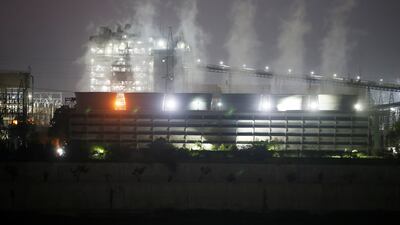The UAE plans to expand its energy relationship with India, by helping the South Asian economy increase its renewable energy capacity to 450 gigawatts by 2030, a government minister has said.
"Our partnership in energy has a great foundation that I want to build on," Dr Sultan Al Jaber, Minister of Industry and Advanced Technology, told India Cera Week forum organised by IHS Markit..
"There are so many opportunities from the full range of our refined and petrochemical products to new energies like zero-carbon, hydrogen.
"And as India expands its renewable energy portfolio, the UAE is keen to build on the investments we have already made to help you reach your 450-gigawatt goal by 2030."
India, the world's third-largest importer of crude, is looking to transition away from its dependence on hydrocarbons and more polluting fuels like coal by investing in renewable energy. The South Asian economy is still dependent on coal to meet the bulk of its energy requirements.
India's energy security is fragile, with the country currently experiencing an electricity crisis amid a shortage of coal. The issue has once again highlighted the need for a rapid transition to cleaner and more sustainable fuels in the world's second-most populous country.
India, which has not revealed any plans to reach net-zero emissions, said it will have 175 gigawatts of renewable energy capacity by 2022.
Ties between India and the UAE in the energy sector have deepened in the recent years, with the South Asian country now the UAE’s top liquefied natural gas customer. Indian companies have also been exploration rights in Abu Dhabi.
In 2018, an Indian consortium of three companies were awarded a 10 per cent participating interest in Abu Dhabi’s offshore Lower Zakum Concession. Another consortium of two Indian oil companies were also awarded the exploration rights for an onshore block in the emirate in 2019.
Abu Dhabi National Oil Company, which is also headed by Dr Al Jaber, has previously expressed interest in India's nascent hydrogen sector.
In April, the UAE company said it was interested in exploring opportunities in hydrogen with India's public and private sector entities.
Adnoc can help India "navigate the global energy transition", Dr Al Jaber said at the time.
"We believe hydrogen offers promise and potential as a genuinely zero-carbon fuel."
The alternative fuel, which has risen in prominence in several markets around the world, is being prioritised for development in the UAE, Opec's third-largest oil producer.
In August, Indian Prime Minister Narendra Modi launched a national hydrogen mission saying: “The thing that is going to help India with a quantum leap in terms of climate is the field of green hydrogen."
Under the Paris climate change agreement, India, which is the world's third-largest carbon emitter, has pledged to reduce its emissions intensity to between 33 per cent and 35 per cent by 2030, from 2005 levels.
Separately, at the forum, India's Minister of Petroleum and Natural Gas Hardeep Singh Puri said the country needed to increase investments in oil and gas, as well as renewables to meet its growing demand for energy.
"There is a need to continue investing in oil and gas. But in addition to that is also the fact that the transition to green energy is also imposing a cost," he said.
Rising prices of crude, gas and petroleum products will impair economic recovery from a Covid-induced crunch harder for countries like India, he added.
Global prices for oil are at a three-year high, with the price of gas nearly 90 per cent higher on an annual basis.
Indian consumers have been particularly hit hard, with prices for petrol and diesel reaching record highs on Wednesday.
"We're about 15 per cent higher on petrol. If prices do not remain predictable, stable and affordable, economic recovery could prove to be fragile and all the efforts that we are making in the area of reviving economic activity could be undermined, which will affect everyone," Mr Singh said.


